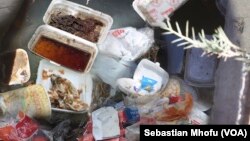Zimbabwe’s Environment Management Agency has ordered the food industry to stop using containers made of expanded polystyrene and replace them with recyclable or biodegradable ones.
The agency recommends restaurants use paper packaging or encourage patrons to partake of their food on site.
The ban on expanded polystyrene (EPS) went into effect immediately, upsetting business owners left with unused stocks.
“I think this is quite unfair,” said Denford Mutashu, the president of the Confederation of Zimbabwe Retailers.
“We are going to comply,” he said, “but we would prefer that it becomes gradual because we need a period where it has to be phased out.”
However, Steady Kangata, the spokesman of the Environmental Management Agency, says this regulation dates back to 2012 and businesses were made aware.
“We have made wide consultations already,” he said. “The instrument that we have activated is an instrument of 2012, so the time lag between activation and promulgation, or gazetting of the regulation, they [the businesses] had promised us that they would come up with something tangible, but up to now nothing has come to fruition. So there is no going back. What they should be doing is looking at alternatives, because alternatives are there and are so many and diverse.”
EPS is a plastic foam, also known as a kaylite. The government says EPS is dangerous because it emits toxic chemicals when the containers are burned, and garbage is routinely burned in Zimbabwe.
Another issue is litter. The containers are among the garbage clogging drainage in Harare and contributing to flooding.
Environmentalists in Zimbabwe are applauding the ban but say the government hasn’t gone nearly far enough. Other African countries, including most recently Kenya, have banned the use of plastic bags.
“Plastics, when they get into the environment, especially in the food chain, are dangerous to animals,” said Christopher Magadza, a professor of environmental studies at the University of Zimbabwe. “And the thing is, people say some plastics are biodegradable. There is no biodegradable plastic. It just breaks up into smaller and smaller bits. … And when plastic catches fire, we breathe it and [it] spoils the air.”
The government says anyone found flouting the EPS ban will be fined between $30 and $5,000.







